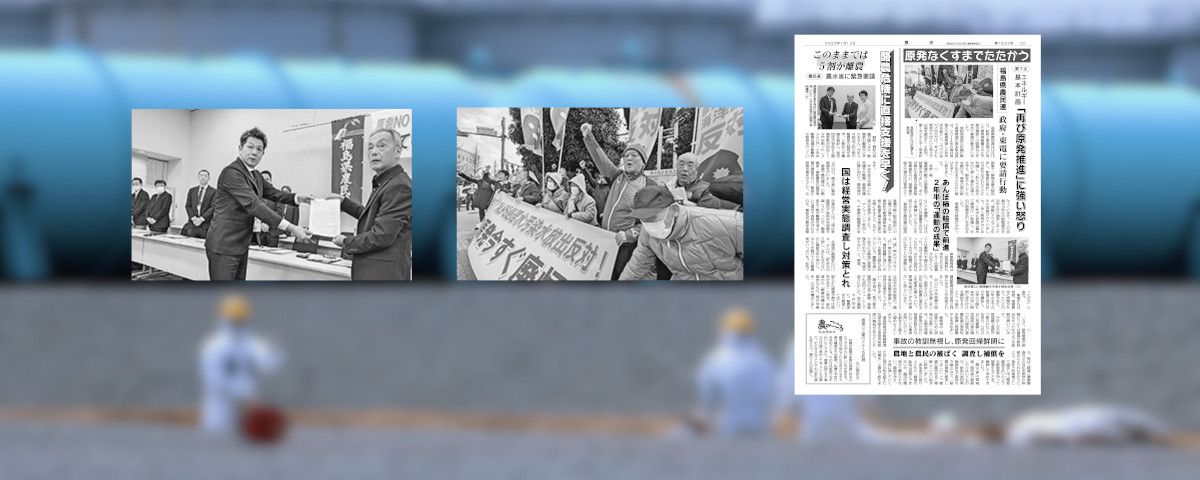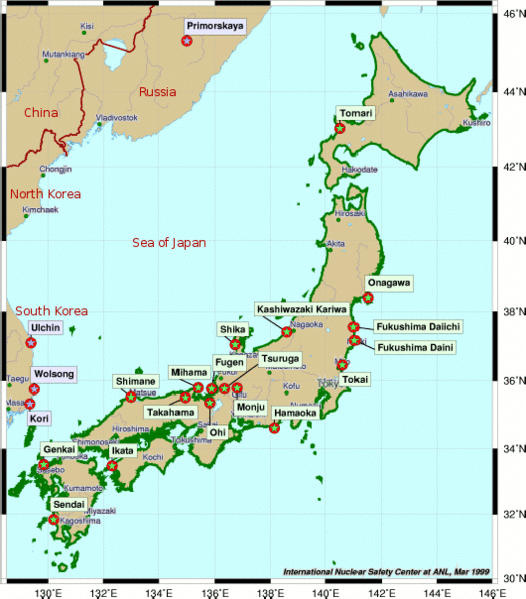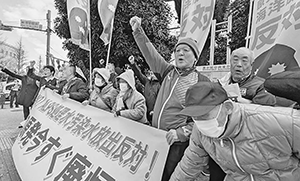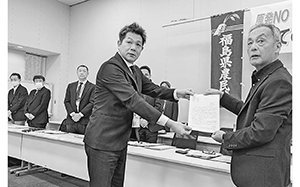Japan: Nouminren Protests Reopening of Nuclear Power Plants, Pledges to Protect Territories

In December 2024, the Japanese Family Farmers’ Movement (Nouminren) held a demonstration outside the Prime Minister’s residence, demanding that the government and Tokyo Electric Power Company (TEPCO) halt the reopening of nuclear power plants and compensate families of farmers affected by past disasters.

The protestors voiced their opposition to Japan’s 7th Basic Energy Plan, which calls for existing nuclear power plants will be fully utilized, and the establishment of new plants. In 2023, Japan’s national nuclear regulator lifted the operational ban that had been imposed in 2021 on the Kashiwazaki-Kariwa plant in northern Japan due to safety breaches, allowing TEPCO to seek local permission for a restart. This plant is TEPCO’s only operational nuclear facility since the March 2011 earthquake and tsunami destroyed the Fukushima Daiichi plant and caused the Fukushima Daini plant to cease operations.
“We will defend our beautiful territories, whose fertility sustains life. We will continue to live, put down roots, and fight until we end nuclear power plants,” said Takashi Nemoto, Chairman of Fukushima Nouminren.
The demonstration, organized by Nouminren’s Fukushima Prefecture chapter on December 19, 2024, called on the government and TEPCO to cease nuclear plant re-openings and provide compensation to affected farmers.
At the protest, Nemoto recalled the Fukui District Court ruling, which had ordered the shutdown of the Ōi Nuclear Power Plant, located north of Kyoto. Ten years ago, the court sided with residents living within 250 km of the plant, who petitioned to stop the restart of Units 3 and 4. The court ruled that “the nuclear power plant must not be operated.”
Nemoto also criticized the short-term economic interests, selfishness, and prioritization of energy needs over human life, warning that such actions would ultimately destroy the country.
Following the January 1, 2024, Noto, Ishikawa earthquake, concerns arose about the effectiveness of evacuation plans for the Onagawa Nuclear Power Plant in Miyagi Prefecture, which resumed operations on November 15, 2023. These concerns prompted calls to halt further nuclear plant operations.
Radiation: Impact on Farmers, Farmland and Food Sovereignty, Past lessons ignored
The demonstration also called for progress in compensating farmers. Producers of dried persimmons, a specialty of Fukushima, regularly check their products for radioactivity. If levels exceed safety thresholds, they halt marketing.

Farmers who requested compensation in 2019 received it after nearly two and a half years of struggle. Despite TEPCO’s apology for the delays, farm union leaders remain unconvinced.
On March 11, 2011, a massive offshore earthquake triggered a tsunami that swamped the Fukushima Daiichi nuclear plant. The disaster released radioactive isotopes into the environment, contaminating local soil and plants. The Japanese government banned the sale of certain products, including leafy vegetables and milk from animals grazing on contaminated grass.
Farmers are upset that the current government push to reopen nuclear power plants ignores the lessons of the past.
In December 2024, at the time of these protests, a government-commissioned panel of experts proposed that nuclear energy supply 20% of Japan’s energy needs by 2040, up from just 8.5% in 2023. The panel cited increasing energy demands from data centers and semiconductor factories, but farmers are resisting this shift. They argue that nuclear energy’s long-term impact on farmland and food sovereignty cannot be ignored, advocating for a greater emphasis on renewable energy sources like solar and wind. Japan’s low food self-sufficiency ratio, relying on imports for nearly 60% of its food supply, is a growing concern.
The Fukushima chapter of Nouminren has consistently called for additional radiation exposure mitigation measures and health controls, beyond those in the current framework. The movement also advocates for the creation of new support schemes for agricultural land with higher levels of radioactive contamination. These areas should be recognized as “unfavorable conditions” to ensure more targeted assistance.
Nouminren also criticizes the government’s focus on decontamination rather than prevention. After the Fukushima disaster, agricultural industries, the Fukushima prefecture, and government agencies began efforts to decontaminate agricultural land, using potassium fertilizers and removing contaminated soil. However, the movement insists that decontaminating farmland affected by radiation is incredibly challenging.
“Farmers cannot be kept away from their land. We need additional measures to protect and preserve them for future generations,” they argue.


